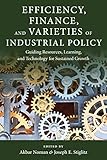Efficiency, Finance, and Varieties of Industrial Policy : Guiding Resources, Learning, and Technology for Sustained Growth / ed. by Joseph E. Stiglitz, Akbar Noman.
Material type: TextSeries: Initiative for Policy Dialogue at Columbia: Challenges in Development and GlobalizationPublisher: New York, NY : Columbia University Press, [2016]Copyright date: ©2016Description: 1 online resource (528 p.) : 80 charts and graphs, 33 tablesContent type:
TextSeries: Initiative for Policy Dialogue at Columbia: Challenges in Development and GlobalizationPublisher: New York, NY : Columbia University Press, [2016]Copyright date: ©2016Description: 1 online resource (528 p.) : 80 charts and graphs, 33 tablesContent type: - 9780231180504
- 9780231542777
- 338.9/27 23
- HC79.E5 E3324 2017
- online - DeGruyter
- Issued also in print.
| Item type | Current library | Call number | URL | Status | Notes | Barcode | |
|---|---|---|---|---|---|---|---|
 eBook
eBook
|
Biblioteca "Angelicum" Pont. Univ. S.Tommaso d'Aquino Nuvola online | online - DeGruyter (Browse shelf(Opens below)) | Online access | Not for loan (Accesso limitato) | Accesso per gli utenti autorizzati / Access for authorized users | (dgr)9780231542777 |
Frontmatter -- Contents -- 1. Learning, Industrial, and Technology Policies: An Overview -- PART I. Theoretical and Conceptual Foundations -- 2. Industrial Policies in Learning Economies -- 3. Dynamic Efficiency: Structural Dynamics and Economic Growth in Developing Countries -- PART II. Development Finance -- 4. Uncertainty, Investment, and Financing: The Strategic Role of National Development Banks -- 5. The Roles of Development Banks: How They Can Promote Investment in Europe and Globally -- 6. Inside the Black Box of Japan's Institution for Industrial Policy: An Institutional Analysis of the Development Bank, Private Sector, and Labor -- 7. Development Banks and Industrial Finance: The Indian Experience and Its Lessons -- PART III. Practice and Proposals -- 8. Industrial Policy Revisited: A New Structural Economics Perspective -- 9. Varieties of Industrial Policy: Models, Packages, and Transformation Cycles -- 10. Industrial Strategies: Toward a Learning Society for Quality Growth -- 11. Could Technology Make Natural Resources a Platform for Industrialization? Identifying a New Opportunity for Latin America (and Other Resource-Rich Countries) -- 12. Manufacturing Development: The Role of Comparative Advantage, Productivity Growth, and Country-Specific Conditions -- 13. Does Manufacturing Colocate with Intermediate Services? Analyzing the World Input-Output Database -- Acknowledgments -- Contributors -- Index
restricted access online access with authorization star
http://purl.org/coar/access_right/c_16ec
Industrial policy, once relegated to resource allocation, technological improvements, and the modernization of industries, should be treated as a serious component of sustainability and developmental economics. A rich set of complimentary institutions, shared behavioral norms, and public policies have sustained economic growth from Britain's industrial revolution onwards. This volume revisits the role of industrial policy in the success of these strategies and what it can offer developed and developing economies today. Featuring essays from experts invested in the expansion of industrial policies, topics discussed include the most effective use of industrial policies in learning economies, development finance, and promoting investment in regional and global contexts. Also included are in-depth case studies of Japan and India's experience with industrial policy in the banking and private sector. One essay revisits the theoretical and conceptual foundations of industrial policy from a structural economics perspective and another describes the models, packages, and transformation cycles that constitute a variety of approaches to implementation. The collection concludes with industrial strategies for facilitating quality growth, realizing more sustainable manufacturing development, and encouraging countries to industrialize around their natural resources.
Issued also in print.
Mode of access: Internet via World Wide Web.
In English.
Description based on online resource; title from PDF title page (publisher's Web site, viewed 02. Mrz 2022)


